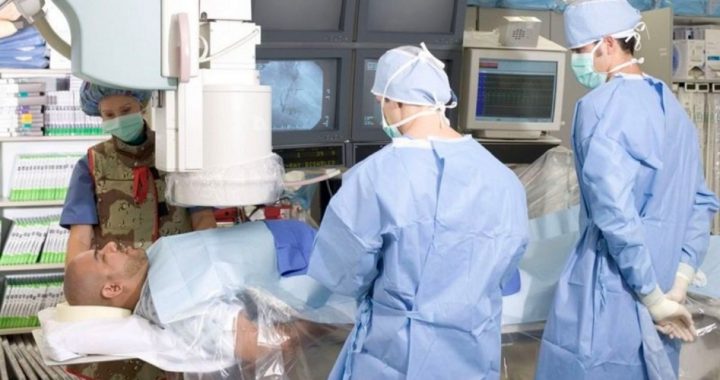
Responding to the “devastating” medical device tax provisioned under President Obama’s Affordable Care Act, Republicans, industry lobbyists, and even some Democrats are scrambling to delay or eliminate altogether the job-killing provision in the law. The National Republican Congressional Committee (NRCC) is targeting a number of top House Democrats on the burdensome tax.
The NRCC released statements calling for Democratic leaders, including Democratic Congressional Campaign Committee Chairman Steve Israel (D-N.Y.) and National Committee Chairwoman Debbie Wasserman Schultz (D-Fla.), to sign a petition to halt the “job-killing medical device tax.”
Furthermore, a group of 17 Senate Democrats have signed a letter urging to delay implementation of the medical device tax, which is slated to go into effect January 1. Interestingly, the very culprits who are responsible for ObamaCare’s passage are attempting to “delay,” or possibly repeal, this contentious element of the law, cautioning that it could liquidate jobs and curb innovation in the healthcare sector. Guy Benson, political editor at Townhall.com, explains:
U.S. Sen. Bob Casey and 16 other Senate Democrats want the medical device tax — included in the 2010 healthcare reform law that they supported — postponed. The 2.3 percent excise tax that devicemakers must pay on their gross sales goes into effect on Jan. 1. It’s one of the new revenues used to offset the cost of the healthcare law. The Internal Revenue Service issued Wednesday its final rules on the tax, which will impact profits on items such as high-tech burn treatments, catheters, back braces and in-home HIV tests. Casey signed a letter to Senate Majority Leader Harry Reid this week asking that he support delaying implementation of the tax. Casey supports fully repealing it. “With this year quickly drawing to a close, the medical device industry has received little guidance about how to comply with the tax — causing significant uncertainty and confusion for businesses,” the senators wrote.
The Minneapolis Star-Tribune notes that both of Minnesota’s Democratic Senators are racing to allay the pending damage sparked by the law — for which they both voted. “Democratic Senators Amy Klobuchar and Al Franken pointed to thousands of high-paying jobs that device companies support in Minnesota, headquarters to such giant devicemakers as Medtronic and St. Jude Medical,” the newspaper reported. “The industry has painted the tax as a job killer that would hurt innovation.”
“The delay would give us the opportunity to repeal or reduce that tax,” asserted Klobuchar, who co-authored the letter sent to Sen. Reid urging the delay. The ultimate goal of the letter is to repeal the tax, the Tribune adds, and the effort is being propelled by a number of heavy-hitting lawmakers in the Senate Democratic leadership.
As noted, jobs and innovation are the two primary concerns regarding the tax, as increased financial burdens on medical device companies could spur layoffs or shutter the doors of businesses altogether. Andre DiMino has been operating the decades-old medical device company ADM Tronics since 2001, when his father passed away, Fox News reported. And despite the economic recession, DiMino has never laid off anybody. “These people are like family with us,” he affirmed.
But thanks to ObamaCare’s devastating new tax, ADM’s ability to retain its workers may be short-lived. “I think after all of these decades of not laying people off, I think we may have to face that,” DiMino acknowledged in an interview with FoxNews.com. Beginning January 1, he said he would likely have to lay off at least three people in manufacturing and possibly more in other divisions of the company.
Other businesses have already taken action because of the law, by both laying off workers and enacting notable budget cuts to research and development. Uresil LLC, based in Skokie, Illinois, has already laid off six people from its 52-employee workforce, “primarily related” to the tax, President Lev Melinyshyn said. “We had never laid off anybody,” he added. “We bought the company in 2004, never had a layoff. In fact, even during the recession, we added jobs…. It wasn’t until this tax hit us that we had to do it.”
Melinyshyn, whose company manufactures specialized catheters, says he is trying to maintain his workforce, but in order to do so he will have to significantly cut back on product development. “A lot of patients, I think, are not going to benefit from new technologies,” he noted. “We’ve literally put all of our new product development on hold … so we can afford to pay the stupid tax.”
Of course, small businesses are not the only entities suffering under ObamaCare’s lingering provisions, as Michigan-based Stryker Corporation, a medical firm employing 20,000 people, announced last year it will lay off five percent of its workforce in anticipation of the tax. Describing the tens of millions of dollars that the company will lose, CEO Kevin Lobo alleged, “We would rather put this money towards jobs, innovation, clinical research and priorities that will create value-added medical technology for patients while helping us partner with hospitals to deliver cost effective solutions.”
Still, the Obama administration insists that the 2.3-percent tax will actually help improve industry profits, because of the millions of new Americans who will have insurance. The White House contends that a broadened customer base will boost the demand in hospitals to buy more equipment — in turn swelling medical companies’ profits.
But the industry has trouble seeing ObamaCare’s so-called benefits. In fact, DiMino attests, some of the law’s damaging impacts have already taken place, not just from layoffs, but from investors “running away” from the healthcare sector altogether.



